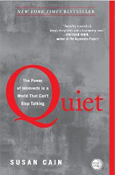
Are you an introvert or extrovert? How do you know? And if you’re an introvert, how on earth do you succeed when, collectively, we seem to talk nonstop?
In her bestselling book, Quiet: The Power Of Introverts In A World That Can’t Stop Talking, Susan Cain addresses these questions. Our neighborhood book club, which typically chooses fiction, recently read Quiet and (ironically, perhaps?) couldn’t stop talking about it! 🙂
With thorough research, well-known and “everyday” examples, and gifted storytelling, Susan has given us a resource that helps us personally, professionally, and in leadership roles.
The extroverts in our book club gained new appreciation and understanding for their introverted relatives and connections (for many, their spouses). And the introverts among us felt this book helped affirm that how they respond to situations is perfectly normal. The phrase, “I was relieved to know it’s not just me!” came up several times throughout our discussion.
A few significant takeaways:
Introvert ≠ Shy.
 Don’t Judge A Book By Its Cover.
Don’t Judge A Book By Its Cover.
You really can’t identify an introvert or extrovert from their public actions. This became abundantly clear in our book club discussion, as we (incorrectly) guessed if each other’s spouses were introverted or extroverted.
One of the many examples Susan gives: Theodor Geisel (a.k.a., Dr. Seuss). Judging from his books, you might assume his personality was as colorful, loud, and entertaining as his writing. In reality, Quiet asserts, “Geisel was a much more quiet man than his jocular rhymes suggest. He rarely ventured out in public, fretting that kids would expect a merry, outspoken, Cat in the Hat-like figure, and would be disappointed with his reserved personality.” Geisel himself admitted, “In mass, [children] terrify me.”
Extroversion Isn’t Better Than Introversion (or vice versa).
Introverts aren’t necessarily smarter than extroverts; extroverts don’t have better ideas than introverts. Susan busts many of these myths throughout Quiet while giving us a greater understanding of how to appreciate and nurture both types – within ourselves as well as within those we lead and live with.
As a leader, knowing the preferences of your followers can help you develop future leaders in a powerful, affirming way. Knowing that one-third of your workforce will become less productive in an open workspace, for example – even though that’s the hot trend – allows you to make decisions that support growth rather than stagnate it. Implications for leaders, teachers, and those connecting with diverse cultures abound in this book.
Above all, Susan’s book encourages us to embrace our authenticity and learn to thrive in all settings. Through concepts like the rubber band theory of personality, the orchid hypothesis, and the restorative niche, she provides sound actions for flourishing and replenishing.
How do YOU succeed in an extroverted world? How do you replenish your energy? Continue the conversation below or on our Facebook page!
You can learn more about Susan Cain, her TED Talk, and Quiet at www.thepowerofintroverts.com.
Dr. Christi Hegstad helps you successfully do what you love! As President of MAP Professional Development Inc., she coaches business owners and leaders to get unstuck and reach meaningful results with clarity, confidence, and meaningful action. Learn more at www.meaning-and-purpose.com and follow Dr. Christi on Facebook and Twitter.





